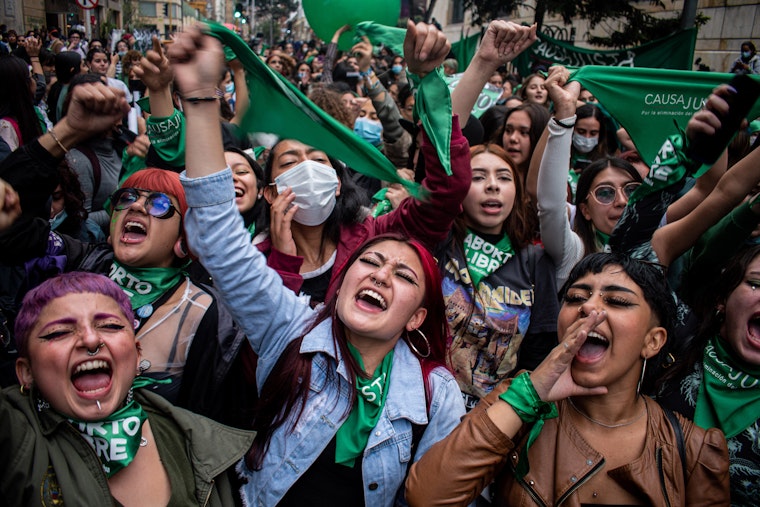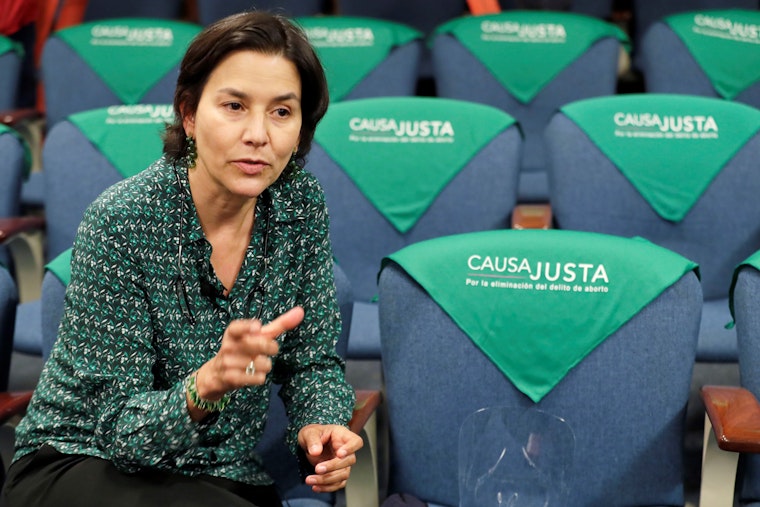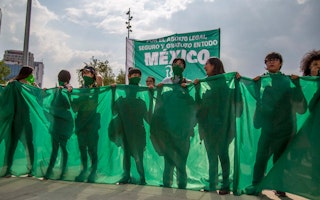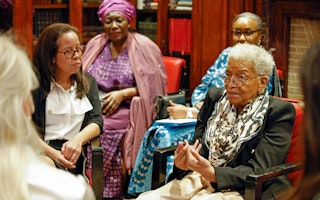The Fight for Abortion Rights in Colombia
By Ana Cristina González Vélez

Less than two decades ago, Colombia had a total ban on abortion without exceptions. Today, the country has some of the most progressive abortion laws in the world, after the nation’s Constitutional Court ruled last year that women could seek the procedure in the first 24 weeks of pregnancy—with exceptions in certain cases after that. The hard-won victory built on decades of brave campaigning and an extraordinary mobilization effort across the country. But the fight is far from over.
For me, this fight began in earnest in 1998, when a group of women and I co-founded the feminist collective La Mesa por la Vida y la Salud de las Mujeres to defend sexual and reproductive rights for women in Colombia. At the time, conservatism and Catholicism dominated everyday life. Eight years later, in 2006, the Constitutional Court decriminalized abortion in the cases of rape, fetal abnormality, and risk of death to the mother. Though the decision was far from adequate, we committed to its implementation by monitoring access, emboldening women’s networks, developing legal expertise, and devising advocacy strategies.
Prior to the ruling, more than 400 women in Colombia were prosecuted for having abortions every year. Most of them were teens and young women, 15–19 years old; some faced up to four years in prison. Compounding the injustice: these women were mostly poor, marginalized, and living in rural areas. Women wishing to end a pregnancy were forced into dangerous, underground abortions, with predictably dire consequences: Every year, some 70 women die and 132,000 suffer complications from unsafe abortions in Colombia.
After years of investing in the 2006 decision implementation allowing abortion in some cases gave activists the evidence, we needed to affirm to both the public and the courts that making an abortion a crime was unfair, counterproductive, inefficient, and discriminatory.
Thus, a movement was born—Causa Justa—to remove abortion from the penal code, driven by women’s groups, doctors, and human rights organizations nationwide. After the peace agreement between the government and the FARC was signed in 2016, we saw a proliferation of pro-choice organizations. Though the conflict may have ended, the fight for a more equal society would continue. Particular attention was paid to involving indigenous, rural, young, and Afro-Colombians—the ones at most risk of being criminalized by the antiabortion regime.

We embarked on a mass nationwide conversation with opinion formers, academics, policymakers, and health care professionals. We deployed evidence-based arguments. We held aloft our green scarves —the color that has now become synonymous with the fight for safe and legal abortions.
While some argued we should use gestational time limits, we know those are arbitrary. In the United States in 2020, for example, 93 percent of abortions happen in the first trimester—roughly the same as in Colombia. The fact is most women seek abortions when they learn they are pregnant. Most women who need or wish to terminate pregnancies later than that face barriers in the health system or may be from social or cultural contexts preventing them making a faster decision.
Instead of focusing on gestational limits, we sought to reframe the debate: Abortion should not be seen as a crime, but rather as a woman’s right, a human right, health care.
A major turning point in the campaign was the publication of our study showing that while women of all ages and backgrounds were having abortions, the ones who were penalized were disproportionately young, poor, and rural women.
We also showed that 30 percent of women accused of abortion crimes were victims of domestic or sexual violence. This changed the conversation: opposition to abortion was in fact opposition to women’s rights. Crucially, many men also supported our cause, including influential politicians such as Humberto de la Calle, the chief peace process negotiator, and future president Gustavo Petro.
We filed a lawsuit at the Constitutional Court to eliminate the crime of abortion. The wheels of justice turned slowly. Small groups of pro-life protests took to the streets in the streets; pro-life protesters tried to provoke us by holding up small coffins and photos of fetuses.
It took the court over 500 days to reach a final decision. In the end, five of nine judges supported change.
The ruling acknowledged the devastating impact the severe restrictions had on women’s lives and their freedom of conscience, and emphasized the important of protecting individuals’ rights to make intimate decisions on the “deeply personal and non-transferable nature of reproductive autonomy,” the court said.
It was a triumph. But the work is not finished. The ruling fell short of complete decriminalization. Understanding of the law is patchy, particular in rural areas. Some medical personnel still refuse to perform procedures, either due to their political beliefs or the legacy of criminalization. Undocumented migrants struggle to access abortions. It has been difficult to sustain interest in the issue following the ruling; funds dry up as people assume the problem has gone away.
But these gains need to be consolidated and defended. The U.S. Supreme Court’s decision overturning of Roe v. Wade has shown women everywhere that hard-won rights can be snatched away. Right-wing politicians, many tied to religious groups in Colombia, are already agitating for a referendum on reversing the law. Regional leaders have threatened to roll back rights. Abortion remains completely prohibited in El Salvador, Nicaragua, and Honduras.
But it is important to underscore the progress. The region is moving forward, thanks to a powerful mobilization of women. Following in the pioneering footsteps of Cuba and Uruguay (laws liberalized in 1965 and 2012 respectively), Argentina recently legalized abortion, as have several states in Mexico. Even in punitive regimes, women imprisoned for abortions have been released through valiant campaigning efforts.
In Europe, recent cases such as the successful Irish referendum on abortion demonstrate that even the most conservative Catholic countries can secure women’s rights. Others, like Poland’s now almost total ban on abortion, show that that progress is not always a straight line. But the global trends remain encouraging; since the turn of the century, 37 countries have adopted more progressive laws on abortion.
Colombia overturned its unjust legislation soon after ending half a century of war that seemed unimaginable at the time. With commitment and resolve, the green wave can turn the tide for millions more across the globe.
La Mesa is a grantee of the Open Society Foundations.
Ana Cristina González Vélez, pioneer of the Causa Justa movement and co-founder of La Mesa, is an international researcher, advocate, and expert in the field of sexual and reproductive health and the right to health and gender equality.


